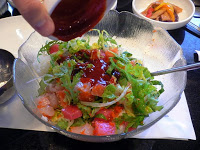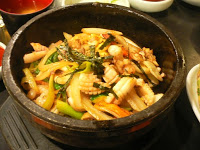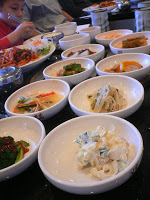Learning to love bibimbap: An Annandale lunchtime primer
You’d be hard pressed to find a standard Korean restaurant that doesn’t serve the humble bowl of rice known as bibimbap (pronounced “bee beam bahp”). For those of you who haven’t discovered what is probably Korea’s most accessible and a favorite lunchtime export, here’s a rice bowl primer. 

Bibimbap is a bowl of rice with fixings, served with a vinegared chili sauce and a side of soup. The most common toppings are spinach, bean sprouts, gosari (a fernlike vegetable), carrot, cucumber, mushroom, zucchini, and egg. Just about anything could make it into a bowl of bibimbap, and each ingredient is prepared in its own way. Variations include meat or seafood.
The meal comes in two vehicles, either a normal bowl or a heavy stone bowl called a dolsot. Dolsot bowls keep the meal warm through the entire experience and usually cost a few dollars more, while regular bowls might work better when you’d rather not bathe in the ambient heat of your meal. Some restaurants serve one or the other; many have both.
 Here are some tips for enjoying bibimbap:
Here are some tips for enjoying bibimbap:• Bibimbap arrives at your table as a neat and colorful presentation of vegetables and rice, but user intervention is required. A good server can guide you through the process, but if you want to come to the table like an expert, know that bibim means “mix” and bap means “rice.” So dribble the chili sauce into the bowl as you mix the rest of the ingredients with the rice until you get an even consistency.
• The chili sauce is spicy, so be careful. There’s no harm in adding just a little, mixing, tasting, and then adding more. If the sauce is altogether too spicy for you, request a dipping sauce for pajeon (“pah juhn”) a Korean pancake, which can work as a nonspicy alternative.
• If you order dolsot bibimbap, check with your server about the egg. Koreans traditionally break a raw egg into dolsot dishes upon serving and let the heated stone bowl and other sizzling ingredients cook the egg as you mix it in. This doesn’t work so well if the diner isn’t fast with the mixing spoon or is squeamish about undercooked eggs. Many restaurants simply fry the egg.
• Use chopsticks to nibble on side dishes, but know that Koreans generally use spoons to eat rice dishes.
 Basic bibimbap in Annandale generally starts around $8 on lunch menus but prices can go as high as $16 for dolsot versions on the dinner menu. More exotic ingredients nudge the price higher. Regular bibimbap is vegetarian friendly as long as you instruct the server to hold any meat trimmings and skip the egg. But strict vegetarians should know that many Korean ingredients and side dishes, including most kimchis, are made with anchovy-based broths.
Basic bibimbap in Annandale generally starts around $8 on lunch menus but prices can go as high as $16 for dolsot versions on the dinner menu. More exotic ingredients nudge the price higher. Regular bibimbap is vegetarian friendly as long as you instruct the server to hold any meat trimmings and skip the egg. But strict vegetarians should know that many Korean ingredients and side dishes, including most kimchis, are made with anchovy-based broths.Bibimbap is virtually a Korean national dish, almost universal in appeal and ubiquitous on restaurant menus. If you’re already a bibimbap veteran and want to give it a different spin, here are a few suggestions.
Restaurants such as Yechon (4121 Hummer Road), Sorak Garden (4308 Backlick Road), Annangol (4213 Annandale Center Drive), and Hangang (7243 Little River Turnpike) have seafood and galbi (barbaque marinated short rib) dolsot bibimbap. Exotic seafood lovers might want to check out the calamari bibimbap at Annangol, which serves dolsot bibimbap bowls featuring grilled squid or nakji, a miniature octopus.
If you’re ready to move beyond the basic bibimbap sphere, look out for albap (“ahl bahp”), a caviar rice bowl available at Hangang and Miso (7410 Little River Turnpike). Sashimi (raw fish) lovers should definitely try hoedeopbap (“hweh duhp bahp”), a sashimi-topped bibimbap variant served at Yechon or Hangang. Yechon also serves a version of bibimbap with shredded raw beef. And if you were thinking vegetables over rice wasn’t healthy enough, try the brown-rice bibimbap at Miso.
Click here to see the location of the restaurants mentioned here.
View Annandale Rice Bowls in a larger map


Fabulous Post, James! I am anxious to get out and try some bibimbap soon.